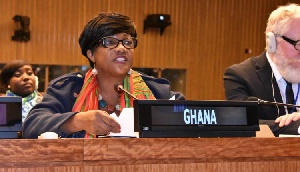The Henry Djaba Memorial Foundation has called on the government to take action and free girls from the exchange of sex for menstrual hygiene essentials.
In celebration of this year's Menstrual Hygiene Day, Dr. Otiko Afisah Djaba expressed pride in the foundation's incredible journey, achievements, and the lives of girls who have experienced and are still experiencing menstruation.
"Indeed, the ability to menstruate is a badge of honor that symbolizes the beginning of puberty, womanhood, and motherhood.
"Girls should be happy to understand that there is nothing dirty or shameful about having our monthly flow.
"We seize this special day, 28th May 2024, to call on the Government to enforce their political will and to duty bearers, parents, men, and boys to take serious action to unchain our girls from sex for menstrual hygiene essentials," she said in a press release.
She believes that World Menstrual Hygiene Day raises awareness of the importance of good menstrual hygiene practices and highlights the challenges faced by women and girls in managing their periods, especially in low-income, poverty-stricken homes where money for daily feeding is a problem, access to clean water is poor, and sanitation and hygienic products are limited.
"For as little as GHC10.00, the cost of the cheapest sanitary towels on the market, some girls will sleep with an unscrupulous boy or man in exchange for this pittance, while others are pushed by parents into prostitution for basic needs.
"Hearing of girls engaging in sex for menstrual essentials is like a horror movie and a nightmare. We need to have the courage as Ghanaians to do right by our girls, needy daughters, and sisters," she emphasized.
Looking at the present dire situation and into the future, she stated that Ghanaians must seek the low-hanging fruits of how to prevent females from this horrible and horrifying reality of engaging in prostitution to manage their menstrual hygiene.
"As a community of Ghanaians, we need to rethink sustainable menstrual hygiene practices for the development of our girls.
"Political will for strategic decisions and actions must be deployed swiftly to stop the destructive impact on our girls and the future of our communities. This is not just a women's matter but a grave national issue.
"So, we call on the government to immediately place zero taxes on all sanitary products and to initiate the establishment of factories to produce affordable Ghana-made sanitary products from alternative sources like banana fiber, among others," she emphasized.
Health News of Thursday, 30 May 2024
Source: happyghana.com













